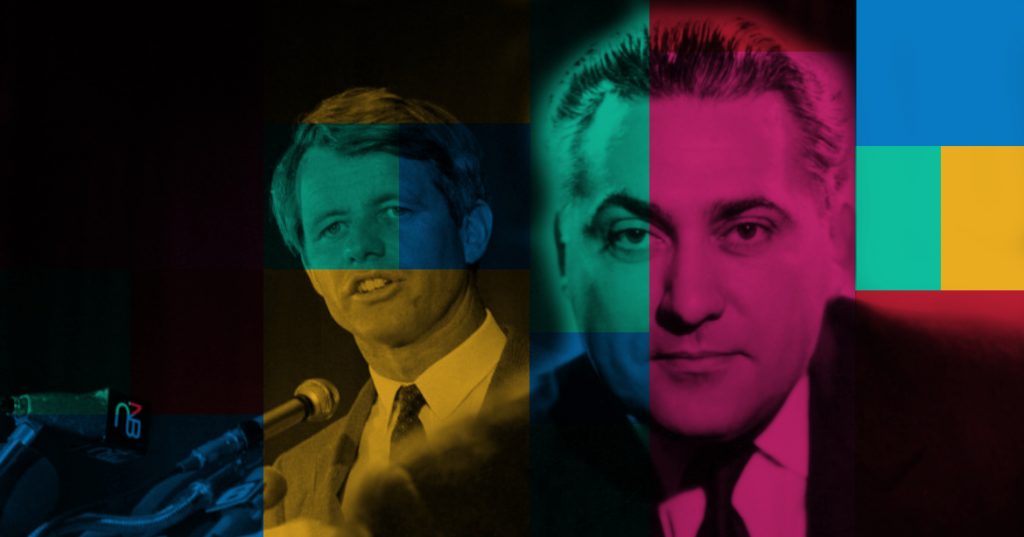Is the real assassin television itself?
In the aftermath of the death of Robert F Kennedy, Milton Shulman tries to start a moral panic

THE COVERAGE of traumatic social events like the assassination of Senator Robert Kennedy now takes an almost predictable course on TV.
Satellite communications enable us to be on the spot within a matter of hours no matter where in the world.
If the TV cameras are actually covering the occasion, and we are within their range, instant involvement with the shock, the panic, the hysteria can be communicated to millions.
Thus, when Martin Luther King was murdered, it wasn’t long before we were all immersed in the whodunit aspects ofl the affair.
The layout of the motel, the angle of trajectory, the lodging house across the way, the white Mustang car.
Similarly, the immediate details of Robert Kennedy’s assassination concerned the kitchen corridor, the swarthy assailant, the girl in the polka-dot dress.
Coupled with this were the close-up accounts of what happened immediately after the shooting – it’s odd how rarely the camera ever catches the actual moment itself.
The blurred, chaotic melee of frantic bodies; the shrieks, moans, cries of bystanders (will one ever forget tile sound of “No! No! No! Oh Christ, no!” as Kennedy lay crumped on the hotel floor); the harassed eye-witnesses trying to recollect their wits as they answer questions, have together become the archetypal visual pattern of assassination in the Telly Age.
Then the longer-range boys take over: the obituaries, the interviews about the causes, the significance, the consequences of the act occupy the energies of 24 Hours, This Week, Panorama, News At Ten for a couple of days.
The details of the funeral – beamed by satellite live at almost any hour — eventually conclude the drama so that the TV screen can get back to its more normal function of picturing life as wallowing in trivia rather than being pre-occupied with concern.
On the whole, British TV handles this sort of event efficiently and responsibly. There is a tendency to over dramatise, to rely too much on professional communicators for philosophical assessments, to hang attitudes on inappropriate visual material just because it happens to be available — but the need for instant comment makes these technical devices almost inevitable.
In the particular case of Senator Kennedy’s assassination, I found a readiness to talk in vague terms about America’s violent society without anyone attempting to assess what port, it any, TV itself contributed to that very violence.
There was a great deal of information about the passion of Americans for carrying guns and the ease with which they can obtain them; about the frontier philosophy that still permeates American thinking; about the pressure groups that demand the widespread sale of firearms — and one might have been forgiven for assuming that all one needed to cure America’s present sickness was stricter gun laws.
Spurred by this latest act of insane horror, President Johnson has set up a Commission to investigate violence in America and to suggest solutions.
If it does its job properly it must seriously and as scientifically as possible gather what facts are available as to what TV in the area of violence, is doing to Western society.
Anyone who watches the routine westerns and police or spy series that make up the vast bulk of American TV knows that such moral issues as they occasionally raise are always settled by some form of violence.
From the moment he can first perceive anything the American child is subjected to this scale of moral values. You don’t have to argue, to be persuasive, to be logical, to be compassionate, to be ethical to achieve your objects in this world. You have to be fitter, faster, stronger.
Having then, been conditioned to believe that it is right to attack evil with force, that it is, indeed, the most effective way of resisting evil, isn’t it, then a natural consequence that someone will shoot a black man, or his employer, or his rival — or a Kennedy — because in his distorted mind his victim is evil? And feel no guilt or remorse about it?
Astonishingly enough there is on the part of most people in authority a tendency to belittle or pooh-pooh this argument. Why is there this reluctance to believe that TV might be having this impact on our young?
I think the first reason is that most people who run society to-day were not as children subjected to the all-pervasive influence of TV. Having been brought up to believe that the written word was the most powerful formative influence on minds, they cannot accept the fact that this may have changed and that TV has insidiously replaced books and newspapers as our society’s most potent conditioner.
In America, too, TV is so innocuous, so silly, so uninvolved with real issues that legislators and teachers tend to dismiss it as having any conceivable social significance.
The same is true in this country where MPs and churchmen and editors and teachers refuse to take TV seriously except where it touches upon minimal aspects of our activities, such as political balance and shock over sex.
The TV channels themselves, as witness the analysis of the Kennedy killing, rarely involve themselves in any critical examination of their own power. Programmes like Talkback, useful as they are, tend to become defence mechanisms for BBC producers to reply to their more cranky critics.
There is also the belief that TV is not much different in character to books, the cinema and the theatre — which also depict violence.
Thus James Reston, the influential American journalist, analysing American violence writes: “The fantasy violence of American literature, television, and the movies, provides a contemporary gallery of dark and ghastly crime, which undoubtedly adds to the atmosphere in which weak and deranged minds flourish.”
But the impact of TV on “weak and deranged minds” is much more personal, more continuous, more unrelenting, more persuasive than anything ever accomplished by books or the cinema.
Books by their nature demand a concentration and a receptivity that only a minority of the population ever subjects itself to for long periods. The films, experienced in a strange environment, attended only periodically and subjected to home environmental influences between film-going, cannot be compared to continuous immersion in TV.
Any budding Capone would have his fantasies dampened after a walk home from the cinema and a cup of hot cocoa served him by his mother. But the TV experience offers no break, no change, no gap to millions of American viewers.
A recent survey of independent radio-TV stations in America showed that 25 pc of those asked — more than 1,500 stations — said that they had never broadcast any programme dealing with controversial issues of public importance. In other words, the western, the domestic comedy, the spy and police thriller made up almost their entire fare.
And a third reason for the reluctance of authorities to blame TV for violence is that they would not know what to do about it if it turned out to be true and accurate.
The fear of censorship runs deeper in politicians and editors in democratic societies than the consequences of violence.
But is censorship the necessary answer? Isn’t responsibility on the part of those who run TV — and a more intelligent method of choosing who should run it — also a way of handling the disease?



